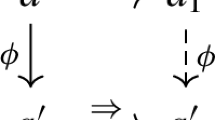Abstract
We propose a modular approach of term rewriting systems, making the best of their hierarchical structure. We definerewriting modules and then provide a new method to prove termination incrementally. We obtain new and powerful termination criteria for standard rewriting, thanks to the combination of dependency pairs and

. Taking benefit of the generality of the module approach while restraining the notion of termination itself (thus relaxing constraints over hierarchies components), we can easily express previous results and methods the premises of which either include restrictions over unions or make a particular reduction strategy compulsory. We describe our implementation of the modular approach. Proofs are fully automated and performed incrementally. Since convenient orderings are simpler, we observe a dramatic speedup in the finding of the proof.
Similar content being viewed by others
References
Arts, T. and Giesl, J.: Modularity of termination using dependency pairs, in T. Nipkow (ed.),9th International Conference on Rewriting Techniques and Applications, Lecture Notes in Computer Science 1379, Tsukuba, Japan, 1998, pp. 226–240.
Arts, T. and Giesl, J.: Termination of term rewriting using dependency pairs,Theoretical Computer Science 236 (2000), 133–178.
Brralleras, C, Ferreira, M. and Rubio, A.: Complete monotonic semantic path orderings, in D. Mc Allester (ed.),17th International Conference on Automated Deduction, Lecture Notes in Computer Science 1831, Pittsburgh, PA, USA, 2000.
Borralleras, C. and Rubio, A.: Termptation, in A. Rubio (ed.), Extended Abstracts of the 6th International Workshop on Termination, WST’03, Technical Report DSIC 11/15/03, Universidad Politécnica de Valencia, Spain, 2003, pp. 61–63.
Contejean, E., Marché, C, Monaté, B. and Urbain, X.: CiME version 2, 2000. Available at http://cime.lri.fr/.
Contejean, E., Marché, C, Tomás, A.-R and Urbain, X.: Mechanically proving termination using polynomial interpretations, Research Report 1382, LRI, 2004.
Courcelle, B.: Recursive applicative program schemes, in J. van Leeuwen (ed.),Handbook of Theoretical Computer Science, Vol. B, North-Holland, 1990, Chapt. 9, pp. 459–92.
Dershowitz, N.: Termination of rewriting,J. Symbolic Comput.3(1) (1987), 69–115.
Dershowitz, N.: Hierarchical termination, in N. Dershowitz and N. Lindenstrauss (eds.),Proceedings of the Fourth International Workshop on Conditional and Typed Rewriting Systems (Jerusalem, Israel, July 1994), Vol. 968, Berlin, 1995, pp. 89–105.
Dershowitz, N. and Jouannaud, J.-P.: Notations for rewriting,EATCS Bull.43 (1990), 162–172.
Fissore, O., Gnaedig, I. and Kirchner, H.: Termination of rewriting with local strategies, in M. Bonacina and B. Gramlich (eds.),Selected Papers of the 4th International Workshop on Strategies in Automated Deduction, Electronic Notes in Theoretical Computer Science 58, Siena, Italy, 2001.
Fissore, O., Gnaedig, I. and Kirchner, H.: Simplification and termination of strategies in rule-based languages, inProceedings of the Fifth International Conference on Principles and Practice of Declarative Programming, Uppsala, Sweden, 2003, pp. 124–135.
Giesl, J. and Middeldorp, A.: Transforming context-sensitive rewrite systems, in P. Narendran and M. Rusinowitch (eds.),Proceedings of the 10th International Conference on Rewriting Techniques and Applications, Lecture Notes in Computer Science 1631, Trento, 1999, pp. 271– 285.
Giesl, J. and Ohlebusch, E.: Pushing the frontiers of combining rewrite systems farther outwards, inProceedings of the Second International Workshop on Frontiers of Combining Systems (FroCoS ′98), Studies in Logic and Computation 7, Amsterdam, The Netherlands, 2000, pp. 141–160.
Giesl, J., Thiemann, R., Schneider-Kamp, P. and Falke, S.: AProVE: A system for proving termination, in A. Rubio (ed.), Extended Abstracts of the 6th International Workshop on Termination, WST’03, Technical Report DSIC 11/15/03, Universidad Politécnica de Velencia, Spain, 2003. http://www-i2.informatik.rwth-aachen.de/AProVE.
Gramlich, B.: Generalized sufficient conditions for modular termination of rewriting,Applicable Algebra in Engineering, Communication and Computing 5 (1994), 131–158.
Gramlich, B.: Abstract relations between restricted termination and confluence properties of rewrite systems,Fund. Inform.24 (1995), 3–23.
Gramlich, B. and Lucas, S.: Simple termination of context-sensitive rewriting, in B. Fischer and E. Visser (eds.),Proceedings of the 3rd ACM Sigplan Workshop on Rule-Based Programming, RULE’02, Pittsburgh, PA, USA, 2002, pp. 29–41.
Hirokawa, N. and Middeldorp, A.: Tsukuba termination tool, in R. Nieuwenhuis (ed.),14th International Conference on Rewriting Techniques and Applications, Lecture Notes in Computer Science 2706, Valencia, Spain, 2003, pp. 311–320.
Klop, J. W.: Term rewriting systems, in S. Abramsky, D. Gabbay and T. Maibaum (eds.),Handbook of Logic in Computer Science, Vol. 2, Clarendon Press, 1992, pp. 1–116.
Krishna Rao, M. R. K.: Simple termination of hierarchical combinations of term rewriting systems, inTheoretical Aspects of Computer Software, Lecture Notes in Computer Science 789, 1994, pp. 203–223.
Krishna Rao, M. R. K.: Modular proofs for completeness of hierarchical term rewriting systems,Theoretical Computer Science 151 (1995), 487–512.
Kurihara, M. and Ohuchi, A.: Decomposable termination of composable term rewriting systems,IEICE E78-D(4) (1994), 314–320.
Kusakari, K., Nakamura, M. and Toyama, Y.: Argument filtering transformation, in G. Na-dathur (ed.),Principles and Practice of Declarative Programming, International Conference PPDP ′99, Lecture Notes in Computer Science 1702, Paris, 1999, pp. 47–61.
Middeldorp, A.: Approximating dependency graphs using tree automata techniques, in R. Gore, A. Leitsch and T. Nipkow (eds.),International Joint Conference on Automated Reasoning, Lecture Notes in Artificial Intelligence 2083, Siena, Italy, 2001, pp. 593–610.
Middeldorp, A. and Toyama, Y.: Completeness of combinations of constructor systems,J. Symbolic Comput.15 (1993), 331–348.
Ohlebusch, E.: On the modularity of termination of term rewriting systems.Theoretical Computer Science 136 (1994), 333–360.
Ohlebusch, E.: Modular properties of composable term rewriting systems,J. Symbolic Comput.20(1995), 1–41.
Rubio, A. (ed.): Extended Abstracts of the 6th International Workshop on Termination, WST’03, Technical Report DSIC11/15/03, Universidad Politécnica de Valencia, Spain, 2003.
Rusinowitch, M.: On termination of the direct sum of term rewriting systems,Information Processing Letters 26 (1987), 65–70.
Steinbach, J.: Generating polynomial orderings,Information Processing Letters 49 (1994), 85–93.
Toyama, Y: Counterexamples to termination for the direct sum of term rewriting systems,Information Processing Letters 25 (1987), 141–143.
Urbain, X.: Approche incrémentale des preuves automatiques de terminaaison, Thśe de doc-torat, Université Paris-Sud, Orsay, France, 2001. http://www.lri.fr/ urbain/textes/ these.ps.gz.
Urbain, X.: Modular and incremental proofs of AC-termination, Research Report 1317, LRI, 2002.
Author information
Authors and Affiliations
Corresponding author
Rights and permissions
About this article
Cite this article
Urbain, X. Modular and Incremental Automated Termination Proofs. J Autom Reasoning 32, 315 (2004). https://doi.org/10.1007/BF03177743
Received:
Accepted:
DOI: https://doi.org/10.1007/BF03177743




